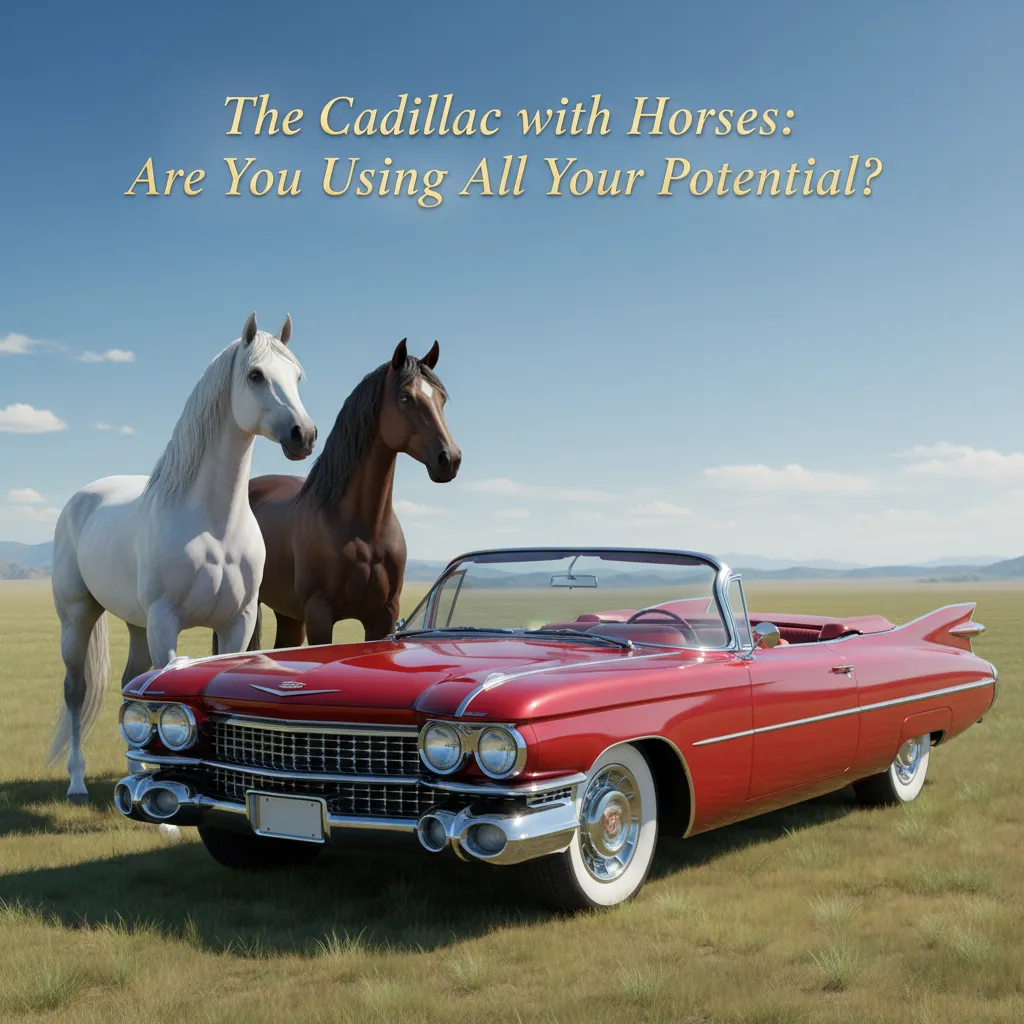Ever looked in the mirror and doubted your own potential? I have—too many mornings to count. After stumbling on a vintage Zig Ziglar speech, I started seeing things differently. The man didn’t just talk about positive thinking—he lived it, wrapping serious personal growth advice in folksy stories and wry humor. Today let’s unpack some of his quirkiest lessons and see if we can spark something new behind your eyes.
The Cadillac with Horses: Are You Using All Your Potential?
One of Zig Ziglar’s most memorable stories is about an old Indian in Oklahoma who, after a lifetime of poverty, suddenly became wealthy when oil was discovered on his land. He bought himself a magnificent black Cadillac—a symbol of success and possibility. But here’s the twist: instead of using the powerful engine under the hood, he hitched two horses to the front and let them pull the car through town. As Ziglar described it, “He was using two. This is what I want to talk to you about tonight. I want to talk to you about the hundred horses that lies inside of every human being.”
This story is a powerful analogy for recognizing inner greatness and the challenge of personal growth. The Cadillac represents our potential—the “engine” of talents, skills, and dreams we all possess. The two horses are the small fraction of our ability that we actually use. Even though the car had an engine capable of 100 horses, the old Indian never learned how to “switch on the ignition.” He coasted through life, unaware of the immense power at his fingertips.
Are You Coasting or Accelerating?
Many of us are like that old Indian. We have resources, intelligence, and creativity, but we only use a tiny portion of what’s possible. Sometimes, it’s because we don’t know how to access our inner strengths. Other times, it’s because self-limiting beliefs hold us back. Zig Ziglar’s motivation and personal growth lessons often focus on overcoming these beliefs and recognizing the greatness within ourselves.
- Self-awareness: The first step is realizing that you have more inside you than you’re currently using.
- Belief: You must believe that your “engine” is capable of much more than you’ve tried so far.
- Action: Learning how to “switch on the ignition” means taking risks, learning new skills, and pushing beyond comfort zones.
Personal Reflection: My Own ‘Two Horses’ Moment
I remember a time early in my career when I coasted through six months at a job, doing only what was required. I didn’t realize I had the tools to excel until a manager challenged me to take on a new project. That push was my ignition switch. Suddenly, I was using more of my abilities, and my confidence grew. Like the Cadillac, I had much more power than I realized—I just needed to recognize it and put it to work.
Lessons from Zig Ziglar Quotes
Ziglar’s teachings remind us that “You are the only person on earth who can use your ability.” The Cadillac story starkly illustrates untapped personal ability. If we only use two horses out of a hundred, we’re missing out on what we could achieve. Recognizing inner greatness is not about arrogance; it’s about self-awareness and the willingness to grow.
“He was using two. This is what I want to talk to you about tonight. I want to talk to you about the hundred horses that lies inside of every human being.”
Are you using all your potential, or are you letting your own Cadillac be pulled by just two horses?

When Biscuits Don’t Rise: Getting Stuck in the ‘Squat’
One of the most memorable Zig Ziglar quotes comes from a story about biscuits—yes, biscuits. During the Great Depression, Ziglar lived next door to a family considered wealthy because they had a cook named Maud, and Maud had something to cook. One day, Ziglar noticed the biscuits Maud served were “no thicker than a silver dollar.” Curious, he asked, “Ma, what in the world happened to those biscuits?” Maud, with her big heart and bigger laugh, replied, “Well, I’ll tell you. They squatted to rise but got cooked in the squat.”
That phrase—“They squatted to rise but got cooked in the squat”—is Ziglar’s perfect analogy for stalled ambition. It’s a vivid image of what happens when we hesitate on the edge of action. The biscuits had all the ingredients and the heat to rise, but they didn’t. They stayed stuck, never reaching their full potential. The same thing happens to us when we get stuck in the “squat”—when we plan, dream, and prepare, but never actually move.
Stalled Ambition: The Trap of Overthinking
If you’ve ever set a goal—personal or professional—and found yourself paralyzed by overthinking, you’re not alone. I’ve been there too. We start with big plans and high hopes, but as soon as action feels risky or uncomfortable, we freeze. We tell ourselves we’re “waiting for the right moment” or “just getting ready.” But as Ziglar’s biscuit story shows, waiting too long means we get “cooked in the squat.”
- Goal setting is only the first step; action is what brings growth.
- Success and failure often hinge on whether we move forward or stay stuck.
- Motivation and personal growth require daily follow-through, not just intention.
What If Your Future Self Gave You a Pep Talk?
Imagine your future self—five, ten, or twenty years from now—looking back at today’s you. Would they cheer you on for taking bold steps, or would they lovingly roast you for dreams left unfulfilled? Sometimes, the best motivation comes from picturing that conversation. Would your future self say, “You squatted to rise, but got cooked in the squat”?
They squatted to rise but got cooked in the squat.
Ziglar’s legacy reminds us that success is a personal standard. It’s not just about the outcome, but about the process of doing and trying. The biscuit story isn’t just about breakfast—it’s about every missed opportunity that comes from hesitation and self-doubt. Whether you’re aiming for a promotion, starting a business, or making a personal change, don’t let your dreams get “cooked in the squat.” Set your goals, and then take action—even if it feels uncomfortable.
As Ziglar taught, the difference between rising and staying flat is often a single decision to move forward. Don’t let your potential stay stuck; let your actions rise to meet your ambitions.

The Flea Jar Effect: Breaking Free from Invisible Limits
One of Zig Ziglar’s most powerful lessons on overcoming self-limiting beliefs comes from his story about training fleas. It’s a simple, almost playful illustration, but it holds a deep message about how easily we can become trapped by invisible limits—limits we often set for ourselves after a few setbacks.
Here’s how Ziglar explained it: If you put fleas in a jar, they’ll jump up and hit the lid over and over. After a while, something interesting happens. The fleas keep jumping, but, as Zig says,
“They’re continuing to jump, but all of a sudden they no longer hit the top. And then you take the top off and they’ll jump and jump and jump, but they can’t jump out.”They’ve learned to stop trying. Even with the lid gone, the invisible ceiling remains in their minds.
This is the flea jar effect. It’s a classic example of conditioned limitation. The fleas could escape, but their belief in the barrier keeps them trapped. Ziglar used this story to highlight how people, too, can become conditioned by past failures or negative voices—what he called “snops” (those who say it can’t be done). We start to believe we can’t go further, so we stop trying, even when the real obstacles are gone.
I saw this play out in my own life. In my first business, every failed attempt made me more cautious. I let those setbacks cap my ambition. I started to believe I could only “jump” so high. It wasn’t until a mentor challenged me to “take off the lid” that I realized my limits were mostly in my head. That moment changed everything. I learned that attitude determines altitude—not just skill or experience, but the belief in what’s possible.
- We all have “jars” in our lives—places where we’ve stopped trying because of past pain or criticism.
- These jars can be built by our own doubts or by negative outside influence. Ziglar warned against letting others’ “garbage” fill our minds and shape our limits.
- To break free, we need to recognize the invisible lids and challenge them, over and over.
Ziglar’s teachings on personal development strategies always come back to mindset. He famously said, “You can’t start a fire with a moving magnifying glass”—meaning, focus is everything when breaking through. If we want to rise above our invisible limits, we must focus on positive thinking and resist the urge to give up after setbacks.
The flea jar effect is a daily reminder: just because you’ve hit the lid before doesn’t mean it’s still there. The key to overcoming self-limiting beliefs is to keep testing your boundaries, keep focusing your energy, and never let someone else’s doubts become your ceiling. Attitude, not aptitude, determines how high you can go.

Motivation Needs Refueling: Building a Daily Practice
One of Zig Ziglar’s most memorable lessons is that motivation is something you need every day, like a shower. It doesn’t last forever, and that’s why building a daily motivation habit is essential for anyone serious about personal growth and lasting success. If you want to see the greatness in yourself, you have to make motivation a regular part of your routine—not just something you chase when you’re feeling low.
Ziglar often joked that most people start their day in “neutral or reverse.” Picture the typical morning: the alarm clock rings, and instead of jumping up with energy, you hit snooze, groan about the weather, and dread the day ahead. This mindset sets the tone for everything that follows. If you start your day expecting “another yesterday,” it’s no surprise when you get the same results. But what if you could change that pattern?
Research shows that only 5 out of 100 people achieve lasting financial success, and the difference often comes down to daily habits. Motivation and personal growth are not one-time events—they’re ongoing processes that need regular attention. That’s why Ziglar’s approach to daily motivation is so powerful. He challenges us to take control of our mornings with a simple but effective ritual: the 21-day positive mindset challenge.
Here’s how it works. For the next 21 days, commit to starting your day with intention. When your alarm rings, resist the urge to complain or hit snooze. Instead, get up, move with purpose, and do something positive—whether it’s reading an inspiring quote, setting a goal for the day, or even singing in the shower. (I’ll admit, I started singing in the shower—even on Mondays. Oddly, it works.) This small shift can have a big impact on your mindset and your results.
Why 21 days? Studies suggest it takes about three weeks to form a new habit. By sticking with this challenge, you’re not just boosting your mood for a day or two—you’re rewiring your brain for a more positive outlook and greater resilience. Over time, these daily motivation rituals become the foundation for personal growth and long-term success.
It’s easy to underestimate the power of these small, daily actions. But as Ziglar reminds us, “Motivation is something you need every day, like a shower.” Just as you wouldn’t skip your daily shower, don’t skip your daily dose of motivation. The impact of motivation on success is real, and the habits you build today shape your future.
In the end, greatness isn’t about one big moment—it’s about the choices you make each day. By refueling your motivation daily and embracing the 21-day positive mindset challenge, you’re investing in yourself and your future. So tomorrow morning, when the alarm rings, remember: you have the power to start your day in drive, not reverse. That’s how you see—and become—the greatness within you.



